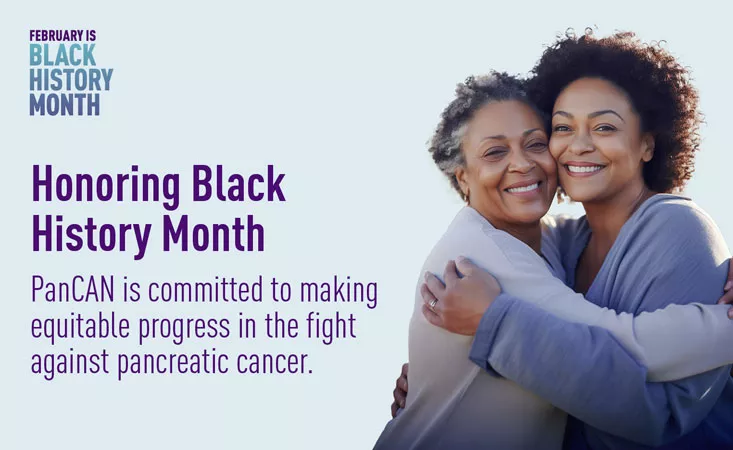
Today marks the beginning of Black History Month, an annual commemoration of the history, stories and accomplishments of Black Americans. Throughout the month, we will highlight the important work of the PanCAN community to make equitable progress in the fight against pancreatic cancer.
PanCAN’s mission is to improve the lives of everyone impacted by pancreatic cancer, but pancreatic cancer doesn’t affect everyone equally. Certain groups bear a disproportionate burden; for example, Black Americans are more likely to be diagnosed with pancreatic cancer than any other racial or ethnic group in the United States.
This means that to fulfill our mission, we need to make sure everyone – but especially those bearing more of the burden from pancreatic cancer – has support. We need to build a future where all people facing pancreatic cancer will thrive no matter who they are.
As the first organization dedicated to fighting pancreatic cancer in a comprehensive way, PanCAN has long been committed to centering health equity and eliminating health disparities through research, advocacy, community engagement and patient support.
“PanCAN is grounded in a culture of equality, equity, diversity and inclusion for everyone,” said PanCAN Senior Vice President of Community Engagement Earnestine Walker. “Health equity is at the heart of everything that we do.”
Today, we take another step forward in our commitment to health equity with the establishment of PanCAN’s inaugural Health Equity Committee.
The goal of the committee is to “advise PanCAN on how we can better tackle health inequities in pancreatic cancer and achieve the best health treatments and outcomes for all,” said Earnestine.
Committee members bring expertise from different sectors, including finance, science and medicine, media and religion. This diversity in experience is intentional, as every person’s unique viewpoint and experience adds to the conversation.
“In order to ensure that health equity is anchored in all that we do, we need the perspectives of everybody -- we need representation of the communities that we serve,” Earnestine said.
The Health Equity Committee is charged with identifying ways to improve the health of those most disproportionately impacted by pancreatic cancer, including racial and ethnic minority populations and rural communities.
The committee will also advise PanCAN on the development of goals and activities within our communities, including decisions related to PanCAN PurpleStride as well as advocacy and funding opportunities.
PanCAN relies on the generosity of our community to bring exciting initiatives like this one to life. Thank you to the members of our Health Equity Committee for serving patients and families through this important work.















